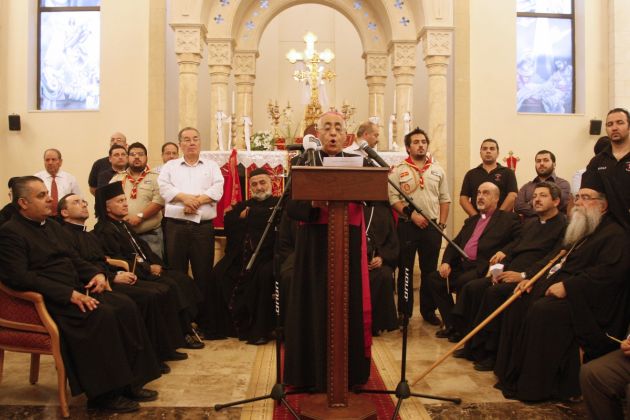UN expert praises Jordan as a 'haven of religious moderation'

United Nations Special Rapporteur Heiner Bielefeldt has praised Jordan as "a safe haven and voice of religious moderation," in a regional environment where religion has become increasingly politicized in recent years.
Bielefeldt visited Jordan from September 2 till 10 and while praising religious tolerance in the country that neighbors Saudi Arabia, Iraq, Syria and Israel, he highlighted increasing concerns about religious extremism.
Jordan has a special place for many Christians, because the Bible says Jesus was baptized there.
"Being itself an Islamic country with a vast majority of Sunni Muslims, Jordan has taken the lead in promoting peaceful interreligious coexistence in the region," said Bielefeldt, a German professor of human rights studies at the University of Erlangen-Nürnberg.
Separately, at a conference in Amman on September 3 and 4 on Challenges facing Arab Christians King Abdullah II of Jordan and Prince Ghazi bin Muhammad, chief adviser for religious and cultural affairs in Jordan attended and which they spoke about to Bielefeldt.
In his address, Prince Ghazi said, "Arab Christians are suffering not only because of the blind and deaf sedition that everyone has suffered from in certain Arab countries since the beginning of what is incorrectly called the Arab Spring, but also merely because they are Christians.
"We reject this categorically and completely. We reject it according to our sacred laws, as Muslims before God. Second, we reject it morally, as Arabs and as fellow tribesmen. Third, we reject it emotionally as neighbours and dear friends."
At the same conference the secretary general of the World Council of Churches, Rev. Olav Fykse Tveit, said, Christians in the Arab world "do not consider themselves as minorities, but rather want to understand themselves as full citizens of their nations, with all that this status entails in terms of duties, responsibilities and full rights."
CHRISTIAN AND MUSLIM LEADERS
The event brought together prominent Christian and Muslim leaders to address the challenges faced by Arab Christians in the region.
Bielefeldt's visit to Jordan was the first visit to the country by an independent expert mandated by the U.N. Human Rights Council to monitor worldwide freedom of religion or belief.
"When visiting a number of schools - both public and private - I saw students from Christian and Muslim families learning together under the supervision of teachers who likewise came from different religious backgrounds," the expert noted.
"Religious differences are mostly seen as something natural, perhaps not even worth highlighting."
Christians make up around 4 percent of Jordan's 6.5 million people.
While Christianity in Jordan includes a broad variety of traditional and less-traditional denominations, almost all Muslims belong to the Sunni branch of Islam.
In State institutions there is a minimum guarantee of nine out of 150 seats in the lower chamber of Parliament for Christian candidates.
"Members of religious minorities have told me that they can generally practice their religion freely without facing unreasonable obstacles from the administration or within their social environment," said the U.N. expert.
He noted that the construction or renovation of churches or other religious buildings is usually undertaken without undue bureaucratic stipulations, and people can manifest their beliefs visibly and audibly, for instance, by wearing (or not wearing) religious garments, holding public processions, performing rituals or announcing prayers.
The Special Rapporteur drew attention to the situation of a few small religious communities not recognized by the State.
While Islam is constitutionally the official religion of the State, Christian churches are also recognized by the State.
This recognition implies a number of privileges, including the possibility of deciding legal matters concerning personal status in their own ecclesiastical courts and largely on the basis of their own respective canon laws. Recognized religious communities include the Greek Orthodox Church, the Roman Catholic Church ("Latins"), Greek Catholics ("Melkites"), the Maronite Church, the Anglican Church, the Syrian Orthodox Church, Seventh-day Adventists and others.
Some other Christian denominations, such as e.g. Baptists or Pentacostalists, have to register under the law of immovable property, which gives them a status largely comparable to registered associations.
Although having the status as a collective legal personality, which is important for organizing community matters in a sustainable manner, they understandably still feel disadvantaged in comparison to officially recognized churches.
BAHA'IS AND EVANGELICALS
Included in this group are Baha'is and some Evangelical denominations, which do not have any status as a legal personality and face big problems when it comes to organizing a sustainable community life.
"This raises serious concerns under freedom of religion or belief, which is not a right merely of individuals but also of communities," Bielefeldt stressed.
The Special Rapporteur emphasized, "amicable relations between people of different religious or philosophical persuasions can never be taken for granted.
"They need to be defended, cherished and further developed based on respect for everyone's freedom of religion or belief. This requires continuous efforts of building trust through institutions and through communication."